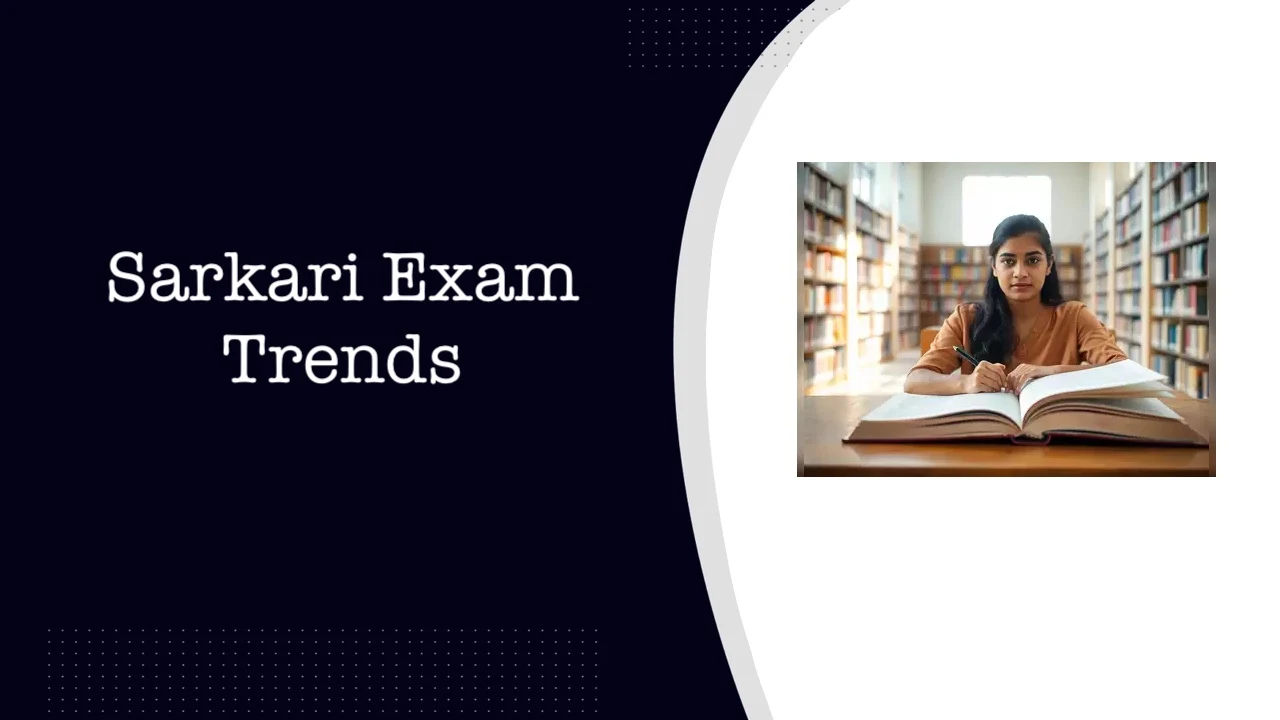Sarkari exam trends are revolutionizing how millions prepare for government jobs, with digital transformation and AI-powered assessments leading the charge. These changes affect everything from exam patterns to evaluation methods, making traditional preparation strategies outdated.
Government examinations now incorporate advanced technology, modified syllabi, and innovative assessment techniques. Understanding these trends helps aspirants adapt their preparation strategy and improve success rates significantly.
Digital Revolution in Government Examinations
Computer-based testing has replaced pen-paper formats across major government exams. Online exams are trending and so is Online Examination Software, transforming how candidates approach preparation and actual test-taking.
Online platforms now host exams for SSC CGL, IBPS PO, RRB NTPC, and numerous other competitive tests. Candidates must familiarize themselves with digital interfaces, virtual keyboards, and time management tools within computer environments.
| Exam Category | Digital Adoption Rate | Key Features |
|---|---|---|
| Banking Exams | 95% | Online proctoring, instant results |
| Railway Exams | 90% | Computer-based testing, biometric verification |
| SSC Exams | 85% | Digital question papers, automated evaluation |
| State PSC | 70% | Gradual transition to online formats |
AI-Powered Proctoring Systems
Artificial intelligence monitors exam sessions to prevent cheating and maintain test integrity. AI-powered proctoring advancements to the rise of dual-camera monitoring represent the future of secure online examinations.
Modern proctoring systems use facial recognition, eye tracking, and behavioral analysis. Candidates experience real-time monitoring through webcams, microphones, and screen recording technologies during test sessions.
Adaptive Testing Mechanisms
Computer Adaptive Testing (CAT) adjusts question difficulty based on candidate performance. This personalized approach ensures fair evaluation across different skill levels and reduces guessing advantages.
Each correct answer leads to more challenging questions, while incorrect responses trigger easier ones. This dynamic system provides accurate skill assessment and prevents candidates from relying solely on luck.
Sectional Time Limits
Individual time constraints for different exam sections replace overall time limits. Candidates must complete each section within allocated timeframes, preventing time borrowing between subjects.
Banking exams like IBPS PO and SBI Clerk implement this pattern extensively. Aspirants need section-wise preparation strategies rather than general time management techniques.
Normalization Scoring Methods
Statistical normalization ensures fairness when multiple exam sessions occur with different difficulty levels. This mathematical approach adjusts raw scores based on overall session performance and question complexity.
Candidates appearing in easier sessions don’t gain unfair advantages over those facing tougher question sets. The system maintains consistent evaluation standards across all test batches.
Multilingual Question Papers
Government exams now offer questions in multiple regional languages alongside Hindi and English. This inclusive approach allows candidates from diverse linguistic backgrounds to participate effectively.
Regional language options reduce comprehension barriers and enable better expression of knowledge. Candidates can switch between languages during the exam for optimal understanding.
| Language Support | Exam Types | Candidate Benefit |
|---|---|---|
| Hindi + English | Central Government | National accessibility |
| Regional Languages | State PSC | Local candidate advantage |
| Trilingual Support | Banking Exams | Enhanced comprehension |
Skill-Based Assessment Integration
Practical skill evaluation complements theoretical knowledge testing in modern government exams. Employers want candidates who can perform job-specific tasks effectively rather than just memorize facts.
Technical posts require hands-on demonstrations, while administrative roles test decision-making scenarios. This trend aligns exam content with actual job requirements and workplace challenges.
Micro-Learning Module Preparation
Bite-sized learning modules replace lengthy study materials as preparation preferences shift toward focused content. Candidates prefer digestible information chunks over comprehensive textbooks.
Mobile apps and online platforms deliver topic-specific lessons lasting 10-15 minutes each. This approach suits busy schedules and improves retention through spaced repetition techniques.
Real-Time Result Declaration
Instant result announcement eliminates waiting periods for preliminary examinations. Computer-based evaluation provides immediate feedback and reduces anxiety among candidates.
Banking and railway exams showcase this trend prominently. Candidates know their performance status within hours rather than waiting weeks for official declarations.
Data Analytics in Performance Evaluation
Advanced analytics provide detailed performance insights beyond simple pass-fail notifications. Candidates receive subject-wise analysis, percentile rankings, and improvement suggestions.
These reports help identify strengths and weaknesses clearly. Unsuccessful candidates can focus preparation efforts on specific areas needing improvement for future attempts.
Integration with Aadhaar Authentication
Biometric verification through Aadhaar ensures candidate identity verification and prevents impersonation. This digital identity system streamlines registration and reduces fraudulent applications.
Fingerprint and iris scanning confirm candidate authenticity during registration and examination phases. The system maintains secure databases linking candidates to their unique biometric profiles.
Mobile-First Examination Platforms
Smartphone compatibility allows exam access from mobile devices alongside traditional computers. This flexibility accommodates candidates without computer access while maintaining security standards.
Mobile interfaces adapt question formats for smaller screens. Touch-friendly controls and optimized layouts ensure smooth examination experiences across device types.
Blockchain Technology for Certificate Verification
Distributed ledger technology prevents certificate forgery and enables instant verification by employers. Government agencies adopt blockchain systems for secure credential management.
Digital certificates stored on blockchain networks provide tamper-proof verification. Employers can authenticate qualifications instantly without lengthy verification processes.
Personalized Study Recommendations
Machine learning algorithms analyze individual performance patterns to suggest customized preparation strategies. These systems identify knowledge gaps and recommend specific study materials.
AI-powered platforms track progress across mock tests and provide personalized feedback. Candidates receive targeted advice based on their unique learning patterns and performance history.
Green Examination Initiatives
Paperless examination systems reduce environmental impact while improving efficiency and cost-effectiveness. Digital formats eliminate printing, transportation, and storage requirements for question papers.
Electronic admit cards, online applications, and digital result declarations support sustainability goals. Government agencies save significant resources while providing better candidate services.
People Also Ask
Digital transformation leads current Sarkari exam trends, with computer-based testing, AI proctoring, and real-time results becoming standard. Adaptive testing and skill-based assessments are reshaping evaluation methods.
Technology introduced sectional time limits, normalization scoring, and multilingual support. Online proctoring systems ensure exam integrity while mobile platforms increase accessibility for candidates.
Banking exams like IBPS PO, railway recruitment tests, and several state PSC examinations implement AI-powered monitoring. SSC CGL and similar central government exams are adopting these technologies.
Most major government exams have transitioned to computer-based formats. Only specific regional or specialized examinations continue using paper-based methods, with complete digitization expected soon.
Normalization adjusts raw scores based on session difficulty and candidate performance distribution. This ensures fair evaluation when multiple exam sessions occur with varying question complexity levels.
Focus on online mock tests, typing speed improvement, and computer interface familiarity. Practice sectional timing and adapt to digital question formats for optimal performance.
Many examination platforms now offer mobile compatibility, though computer access remains preferred. Smartphone interfaces provide backup options for candidates with limited computer access.
Computer-based evaluation provides highly accurate instant results for objective questions. Subjective components may require additional processing time for manual evaluation by experts.
Sarkari exam trends continue evolving with technological advancement and candidate needs. Aspirants must stay updated with these changes and adapt preparation strategies accordingly. Success depends on understanding both traditional concepts and modern examination formats.
Government job seekers should embrace digital preparation methods, practice with mock tests, and develop technical skills alongside subject knowledge. These trends represent opportunities for better assessment and career advancement in public sector employment.

